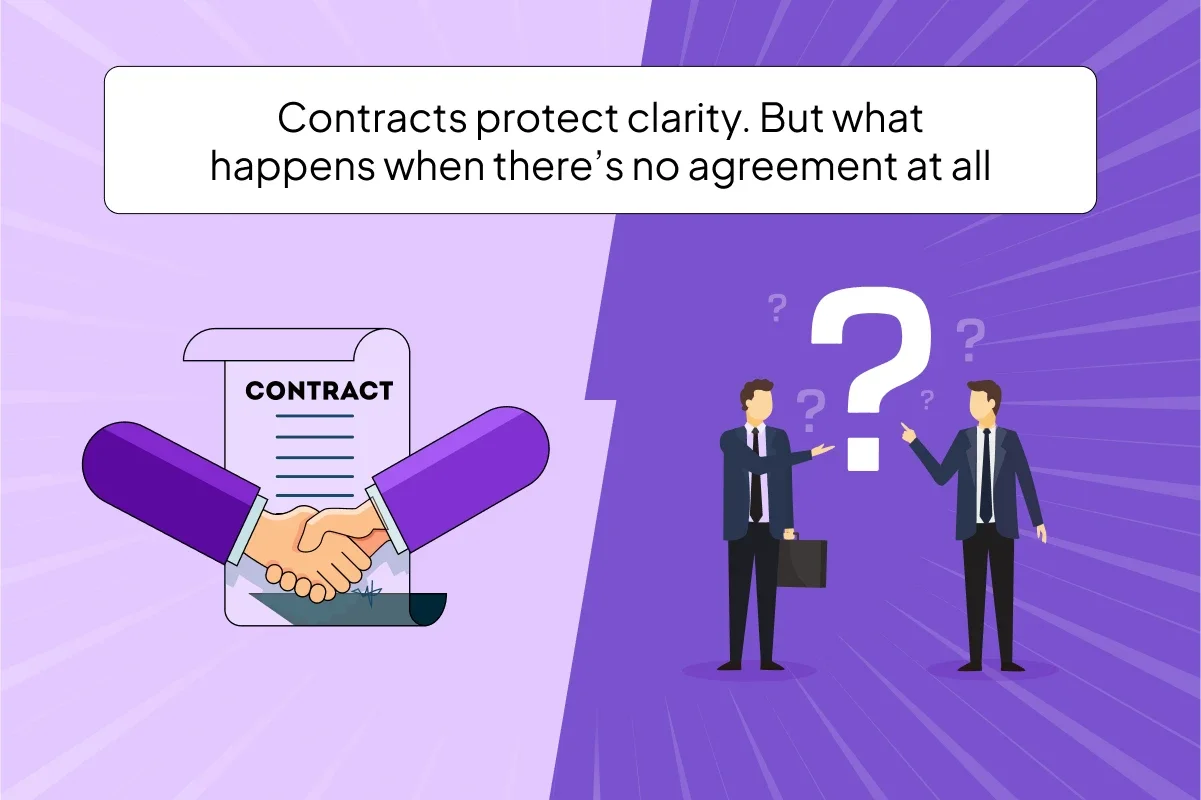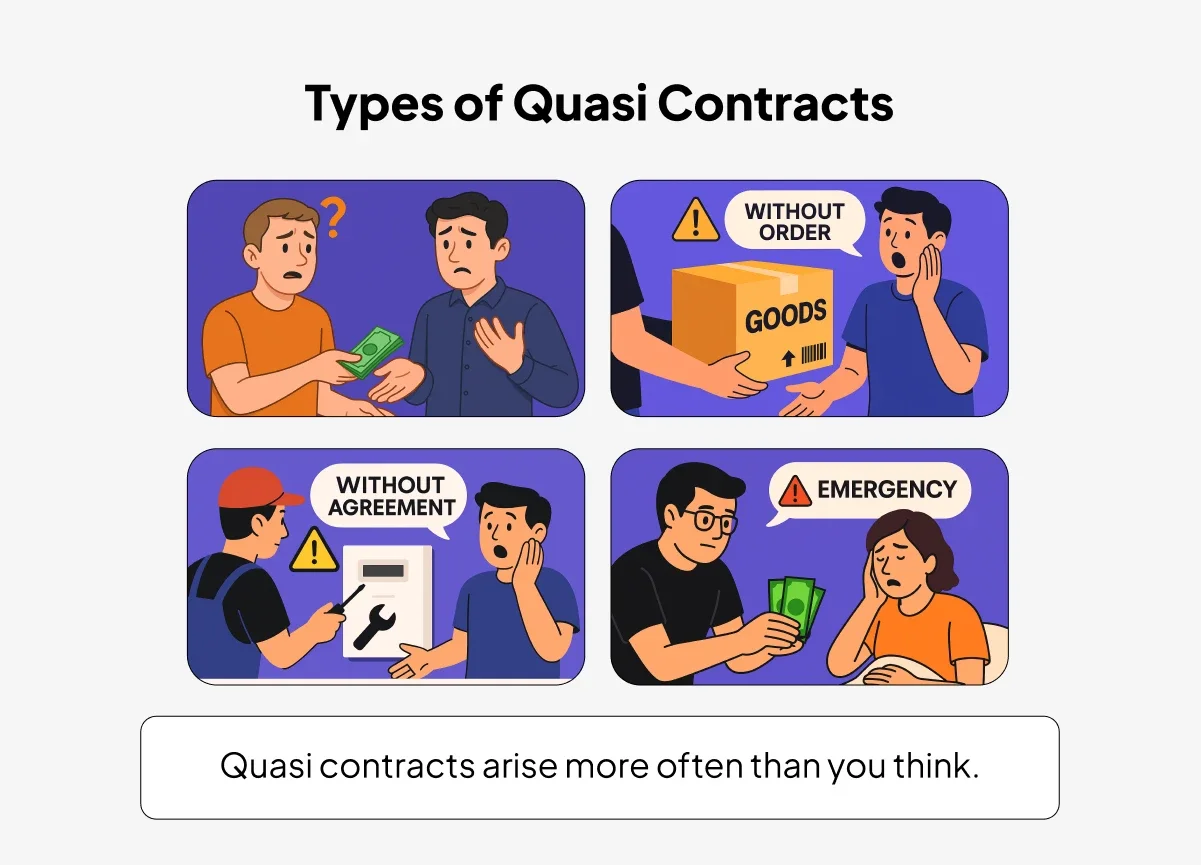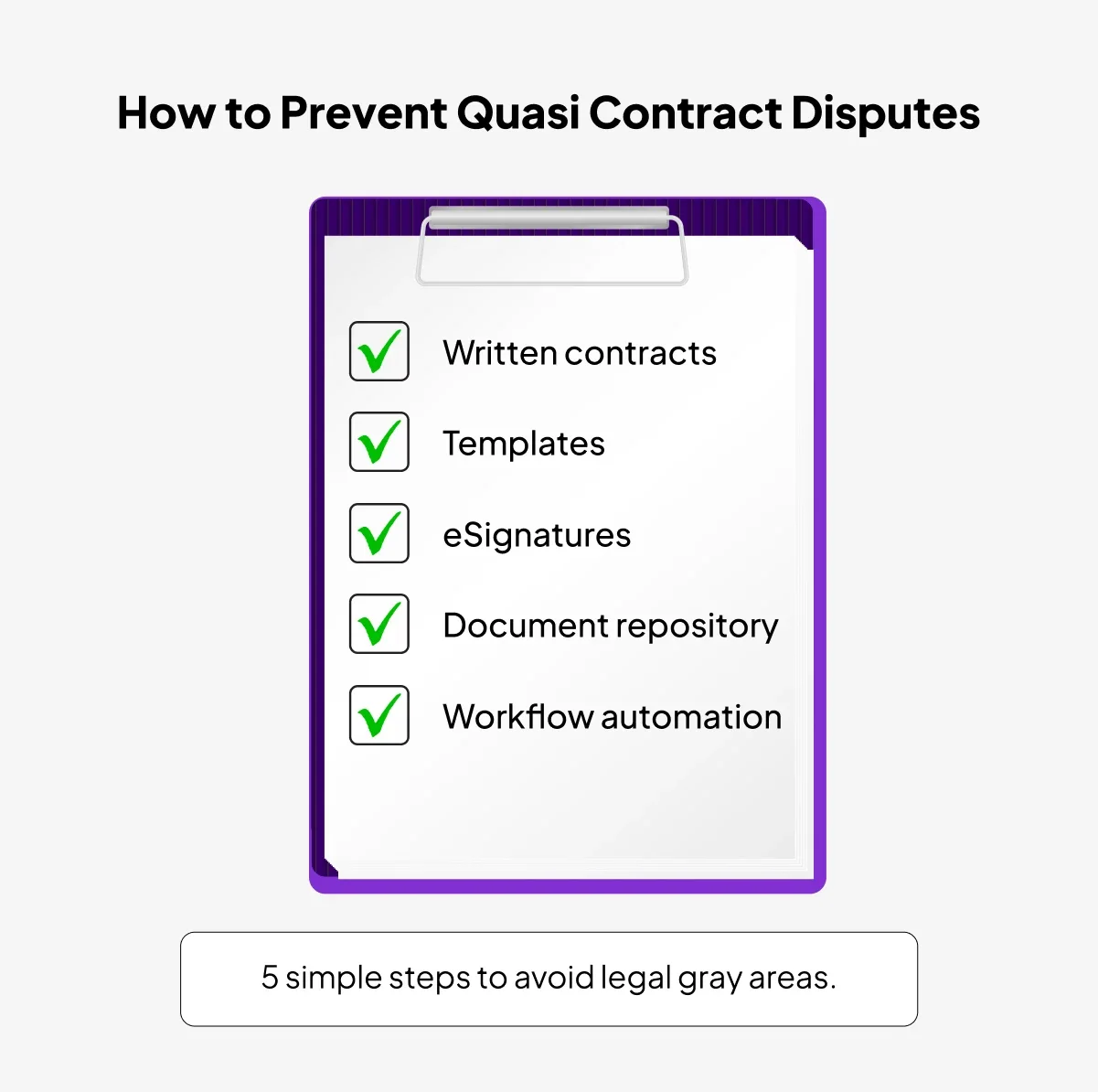Let’s say a vendor delivers goods to your office, assuming it was a valid order. You use the goods. But no one actually signed anything. Now the vendor wants payment.
Legally, can they demand it?
Yes. They totally can.
In business, lack of formal agreements leads to confusion, risk, and messy disputes. But the legal system doesn’t always let people walk away scot-free. Quasi contracts are one such safety net. But wouldn’t it be better to avoid that courtroom altogether?
That’s where ZoopSign comes in. It’s your contract management companion: from drafting to signing to storing, making sure the "we forgot to sign" excuse never hurts your business again.
What Is a Quasi Contract in Business Law?
Let’s clear one thing up: a quasi contract isn’t a real contract in the traditional sense. There’s no handshake, no signature, no mutual agreement. So why is it still legally binding?
Because sometimes, fairness trumps formality.
A quasi contract is a legal remedy: a situation where a court steps in and says, “Even though there was no formal contract, we’re going to act as if there was.” Why? Because allowing one party to unfairly benefit at the expense of another just isn’t right.
What Is the Legal Backing for Quasi Contracts in India?
Quasi contracts are recognized under Sections 68 to 72 of the Indian Contract Act, 1872. These sections define specific situations where obligations can be imposed by law, even without consent.
In legal terms, this is all about preventing “unjust enrichment.” That’s when one party gains something valuable: money, goods, or services; without paying for it, and at the cost of someone else.
For example- You never agreed to buy goods, but they were delivered to your business and you used them. You benefitted. The supplier didn’t get paid. You didn’t agree to pay, but you accepted the benefit.
The court steps in and says: Pay up.
So while there’s no contract on paper, the law imposes an obligation as if there was one, to ensure justice and accountability.
What Are the Key Features and Elements of Quasi Contracts?
To understand quasi contracts, think of them as legal band-aids: used when no formal agreement exists, but someone still ends up bleeding money, time, or resources.
While there's no paperwork involved, the law still imposes a duty. Why? Because letting one party enjoy benefits without any responsibility just isn’t fair.
Here are the core features that define a quasi contract:
1. No Actual Agreement
There’s no formal contract, discussion, or even handshake. The parties didn’t agree to anything; intentionally or otherwise. And yet, a legal obligation may arise.
2. One Party Gains at Another’s Expense
One side ends up with a benefit (goods, services, money) without paying for it. The other side suffers a loss by providing that benefit.
3. Unjust Enrichment Must Be Prevented
The guiding principle here is fairness. Courts step in when one party is “unjustly enriched”; meaning they’ve profited in a way that’s legally or morally unfair.
4. Legal Obligation Imposed by the Court
Unlike standard contracts where both parties choose to be bound, a quasi contract is imposed by a court to ensure justice. It's not born out of intent, it's born out of necessity.
Quasi Contracts vs. Standard Contracts: A Quick Comparison
Read More: How to Write a Contract Addendum with E-Signature Benefits
What Are the Types and Examples of Quasi Contracts in Indian Business Law?
Here are some common quasi contract scenarios recognized by Indian law:
1. Supply of Necessaries
If someone supplies essentials to a person who can’t contract (like a minor or mentally ill individual), they can recover the cost.
2. Payment by Mistake
If you accidentally pay someone money you don’t owe, they’re legally required to return it.
3. Non-Gratuitous Act
When someone voluntarily does something useful for another (without intending it as a gift), they may be entitled to compensation.
Real-World Business Scenarios:
- A vendor ships goods to the wrong business address. The business uses the goods.
- A finance team accidentally pays an old supplier twice.
- A temp agency sends workers who are unknowingly deployed, but not contracted.
References:
- Indian Kanoon - Section 70 of Indian Contract Act
- LiveLaw - Quasi Contracts Explainer
- Law Times Journal - Quasi Contracts Article
What Are the Risks and Challenges of Quasi Contracts for Businesses?
Quasi contracts might seem like a helpful legal backup, but relying on them can be risky, and expensive. When there’s no signed agreement, you’re walking into a courtroom with assumptions instead of proof.
Here’s why businesses should avoid falling into quasi contract situations in the first place:
1. Unclear Liabilities
Who owes what? Who is responsible? Without a formal contract, these questions become tough to answer. Quasi contracts leave room for interpretation and confusion.
2. Unpredictable Court Decisions
Quasi contracts depend heavily on judicial discretion. That means outcomes vary case by case, judge by judge. Even if you feel you’re right, there’s no guaranteed win.
3. Delayed Payments or Disputes
When there’s a disagreement over obligations, payments can get stuck. Months or even years, can go by before the matter is settled.
4. Damage to Reputation
A legal dispute, even if minor, can tarnish business relationships. Clients, vendors, or partners may think twice before working with a company that’s been involved in avoidable legal troubles.
5. Increased Legal Costs
No contract = more time, more arguments, and more legal paperwork. And guess who pays for all that? You do.
How Can Businesses Prevent Quasi Contract Disputes Using ZoopSign?
If quasi contracts are the court’s way of patching up undocumented dealings, the smarter move is to never leave things undocumented in the first place.
Here’s the good news: preventing quasi contract disputes is surprisingly simple, if you have the right tools in place. Let’s break it down.
Step 1: Always Have a Written Contract
Verbal promises don’t hold up well in court. Every business transaction - no matter how routine should be backed by a written contract. That way, responsibilities are clearly defined and enforceable.
What can you do? Use ready-made legal contract templates tailored for businesses. No legal jargon to decode, no clauses left behind.
Step 2: Standardize & Speed Up Your Agreements
Manually drafting the same type of contract over and over? That’s a recipe for inconsistency and errors.
What can you do? Use standardized templates and digital signing tools to speed up the process while keeping things legally sound.
What you can do? With Aadhaar esign and Digital eSignatures, your contracts become legally valid within minutes. Compliant with the IT Act, 2000, and accepted in courts of law.
Step 3: Keep Your Documents Where You Can Find Them
Ever lost a contract in a messy inbox or an old folder? Happens more often than you'd think. And when disputes arise, you can’t afford to go hunting.
What you can do? A centralized, cloud-based contract repository ensures every agreement is just a search away.
Step 4: Automate the Flow
Approvals stuck in internal loops? Deadlines missed? These small hiccups lead to major legal blind spots.
What you can do? Set up automated workflows for contract review, approval, signing, and reminders. Keep everyone in the loop, reduce manual errors, and save time.
Step 5: Leave a Trail
When a dispute arises, proof matters. Who signed what, and when? Without proper tracking, even valid agreements can be questioned.
What you can do? With detailed audit trails, every action is time-stamped and recorded, a powerful tool if things ever escalate legally.
Why Thousands Trust ZoopSign for Contract Management?
Whether you're closing a high-value deal or onboarding a freelance designer, ZoopSign contract management software has your back. Here’s what makes it stand out:
- Legally compliant (IT Act, Aadhaar eSign, global norms)
- Bank-grade security for documents and user access
- Affordable plans for startups, SMBs, and large enterprises
- Scalable and global, trusted by over 2500+ businesses
- User-friendly interface get started in minutes, no training needed
From solo entrepreneurs to enterprise legal teams, ZoopSign helps you ditch the chaos and own your contracts, start to finish.
Conclusion
Quasi contracts are a legal fallback, but smart businesses don’t rely on luck. They document everything, automate workflows, and leave no room for ambiguity.
That’s what ZoopSign helps you do.
Create. Sign. Store. Protect.
Explore ZoopSign today or request a free demo. Your contracts deserve better than courtroom debates.
FAQs
Q: What is the difference between a contract and a quasi contract?
A: A contract is a mutual agreement. A quasi contract is imposed by law to prevent unfair gain.
Q: Is a quasi contract enforceable in court?
A: Yes, courts can enforce quasi contracts to ensure fairness.
Q: How does ZoopSign ensure contract enforceability?
A: With Aadhaar and Digital eSignatures, audit trails, and compliant contract templates.
Q: What is another name for a quasi contract?
A: Also known as an implied-in-law contract.
Q: What are the two kinds of quasi contracts?
A: Obligations due to supply of necessities and Recovery for services rendered or money paid
Q: Is quasi contract the same as promissory estoppel?
A: No. Quasi contract is about preventing unjust enrichment. Promissory estoppel relies on a promise that was relied upon.
Q: What is the doctrine of quasi contract?
A: It refers to legal obligations imposed by courts to ensure fairness in absence of an actual contract.



